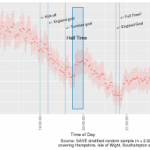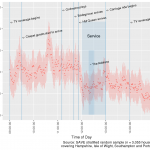This is a collection of our #fridayFagPackets: numbers done on the back of one. #YMMV, health warnings apply..
Whose flexibility is it anyway? 08-2021 
Authors: Ben Anderson & Tom Rushby The importance of flexibility for a zero-emissions electricity system continues to drive considerable research and socio-technical innovation across CREDS and its linked activities. Inherent in much, although not all, of this work is the notion that we need to find ways to enable flexibility at the consumer end of the ...
Retrofit ROI – or why life expectancy matters to decarbonising the dwelling stock 12-2020 
#fridayFagPackets: numbers done on the back of one. #YMMV. Contributors: @dataknut, @tom_rushby We’ve talked about the cost of retrofitting the nation’s dwelling stock in a couple of places. The first was a reflection on levels of public investment in retrofit compared to the very large sums required and the other was in a de-carbonising the dwelling stock ...
De-carbonising the (English) dwelling stock – a policy tracker 11-2020 
UK residential dwellings are currently responsible for 15% of UK greenhouse gas emissions (or around 22% including electricity consumption) and so form a major problem for our net-zero carbon ambitions. This inconvenient but incontrovertible truth is well recognised by government in terms of increasing the energy performance (EPC Band rating) of all dwellings: “In 2017, the government ...
Retrofit or bust: the (possible) cost of de-carbonising the nation’s homes 10-2020 
#fridayFagPackets: numbers done on the back of one. #YMMV. It seems like we can’t snooze for a second without HM Govt announcing another ‘build back better’ initiative. The sentiment behind these is totally to be applauded: invest public £ in job (and skill) creating schemes which help fix our energy inefficient homes thereby reducing energy demand ...
The End of the World (Cup) 08-2018 
… for England. We didn’t plan the SAVE household sample recruitment and data collection period to over-lap with the 2018 World Cup but we had no end of fun when it did. We started out with some quick analysis of pick-ups (or not) of power demand during the game against Tunisia on June 18th before moving ...
UK household power demand and #worldcup2018 06-2018 
Author: Ben Anderson (b.anderson@soton.ac.uk, @dataknut) We recently posted a brief analysis of household power demand during the May 2018 Royal Wedding which showed a number of surges and dips associated with events in Windsor. In this post we switch to events in Russia – and specifically the first England game of World Cup 2018 (vs Tunisia). ...
Super Saturday and spikes in demand 05-2018 
Author: Ben Anderson (b.anderson@soton.ac.uk, @dataknut) A while ago we posted a brief analysis of Christmas Day 2016 which showed that it was a most unusual Sunday. Although there was little evidence of positive ‘spikes‘ in household electricity demand due to synchronised behaviour, HM The Queen’s TV broadcast appeared to cause a distinct negative spike and there ...
A Most Unusual Sunday 01-2017 
Author: Ben Anderson (b.anderson@soton.ac.uk, @dataknut) There is often talk in the media about the ‘spikes’ in energy demand caused by breaks in television schedules – when everyone is supposed to jump up and put the kettle on (or whatever). Although these make for good media stories, the largest overall surges are probably to do with cooking ...
